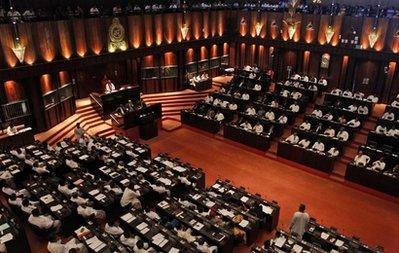
Sri Lanka’s parliament voted overwhelmingly Tuesday to restore a two-term limit for presidents and revive independent bodies to manage key institutions such as the police and the judiciary.
A total of 215 out of the 225 lawmakers approved a constitutional amendment which restores presidential term limits, reversing a change by former strongman Mahinda Rajapakse who scrapped them after being re-elected in 2010.
The amendment was in line with a pledge by President Maithripala Sirisena. His election victory in January ended Rajapakse’s decade in power, during which he granted himself more powers over the police, the judiciary and civil servants.
Tuesday’s bill also removed the president’s power to dissolve parliament until it has completed four and a half years out of its five-year term.
Previously, the president had the power to sack parliament after completing one year, a threat Rajapakse had used to keep lawmakers in line.
The amendment was watered down, however, to ensure that the minority government secured the support of the opposition, whose votes were crucial to gain a mandatory two-thirds majority.
Sirisena’s government does not enjoy a majority in parliament.
The government agreed to accommodate four more legislators in a Constitutional Council which will make key appointments to run 11 public institutions such as the police, the judiciary, the elections office and the civil service.
“This is not ideal. We had to compromise because we don’t have a two-thirds majority on our own,” Prime Minister Ranil Wickremesinghe told parliament.
He said the government hoped to reduce the number of politicians in the Constitutional Council, which aims to depoliticise state institutions and ensure their independence.
The government did not say if parliament would be dissolved soon after passing the bill, in line with a pledge by Sirisena earlier this month.
The current parliament can run until April 2016, but Sirisena had said he would call fresh elections on April 23. He delayed the dissolution to give the opposition more time to pass the bill.



